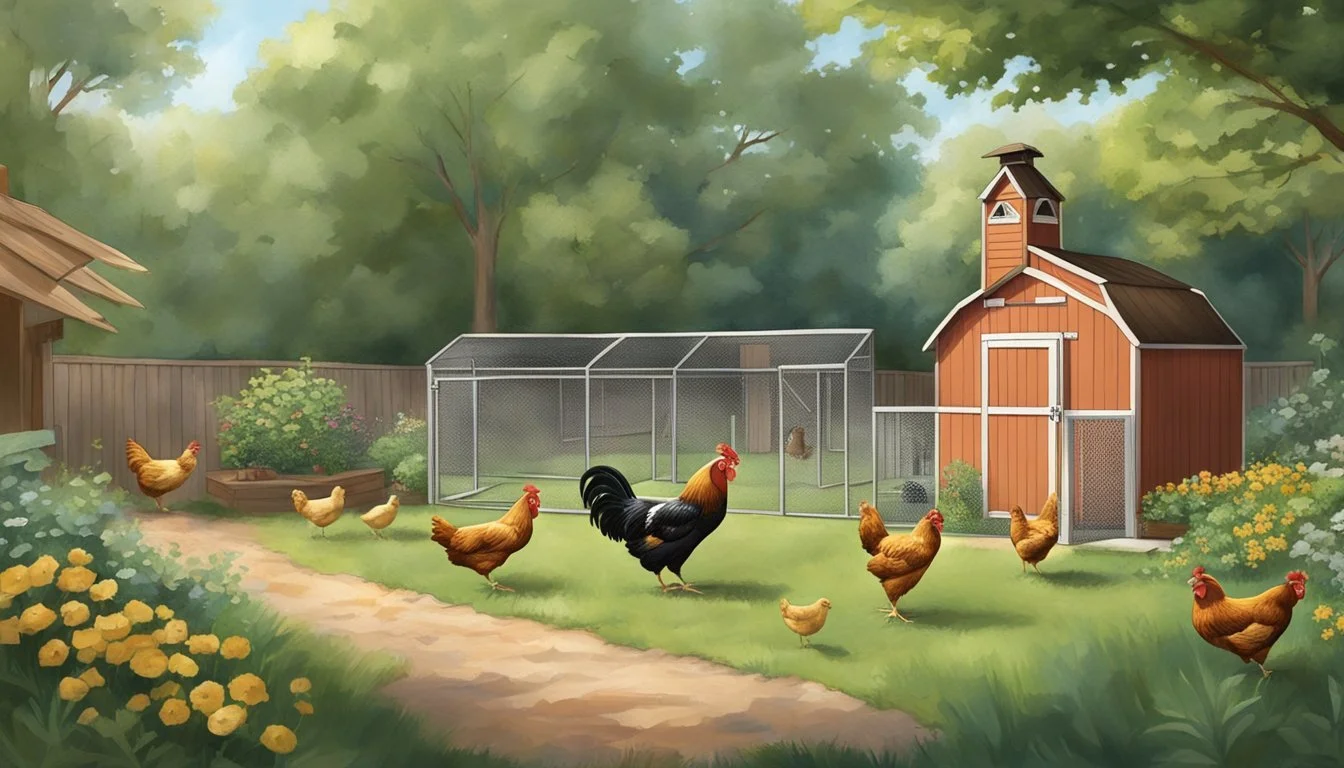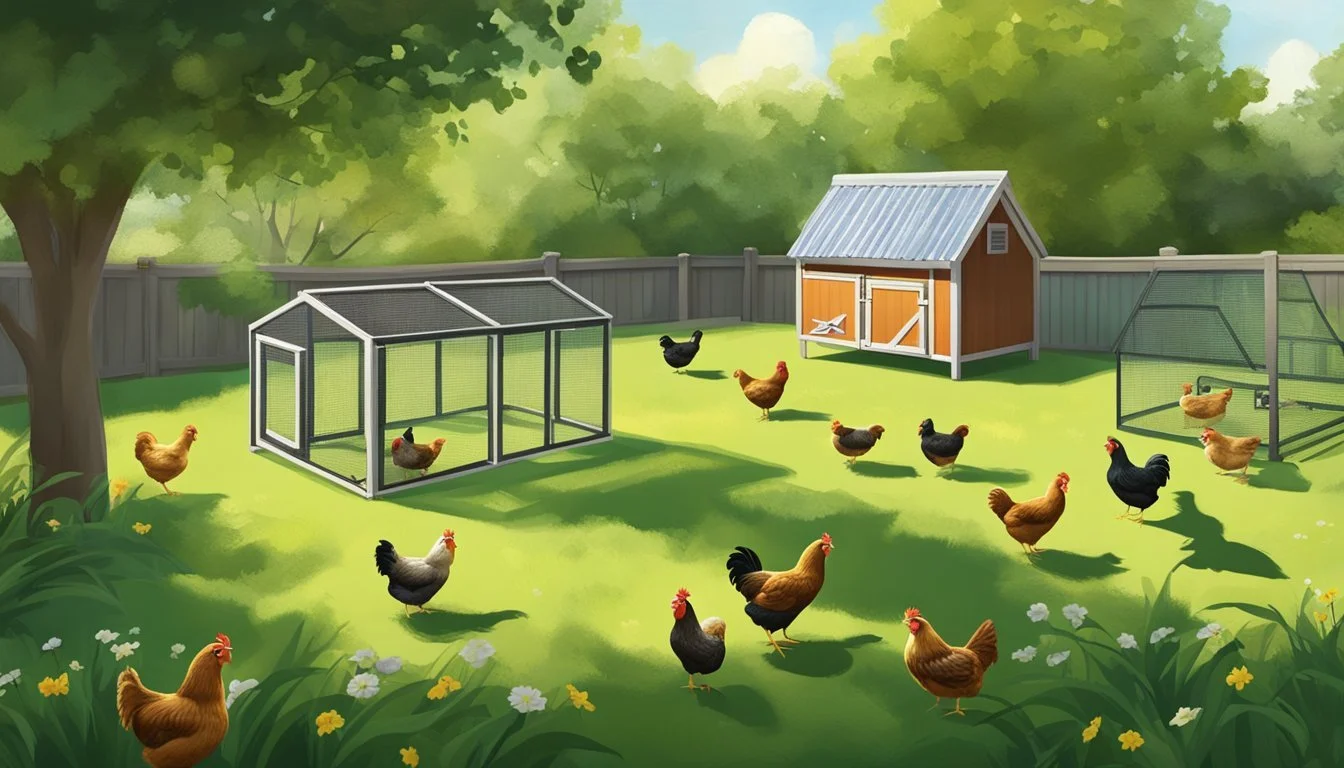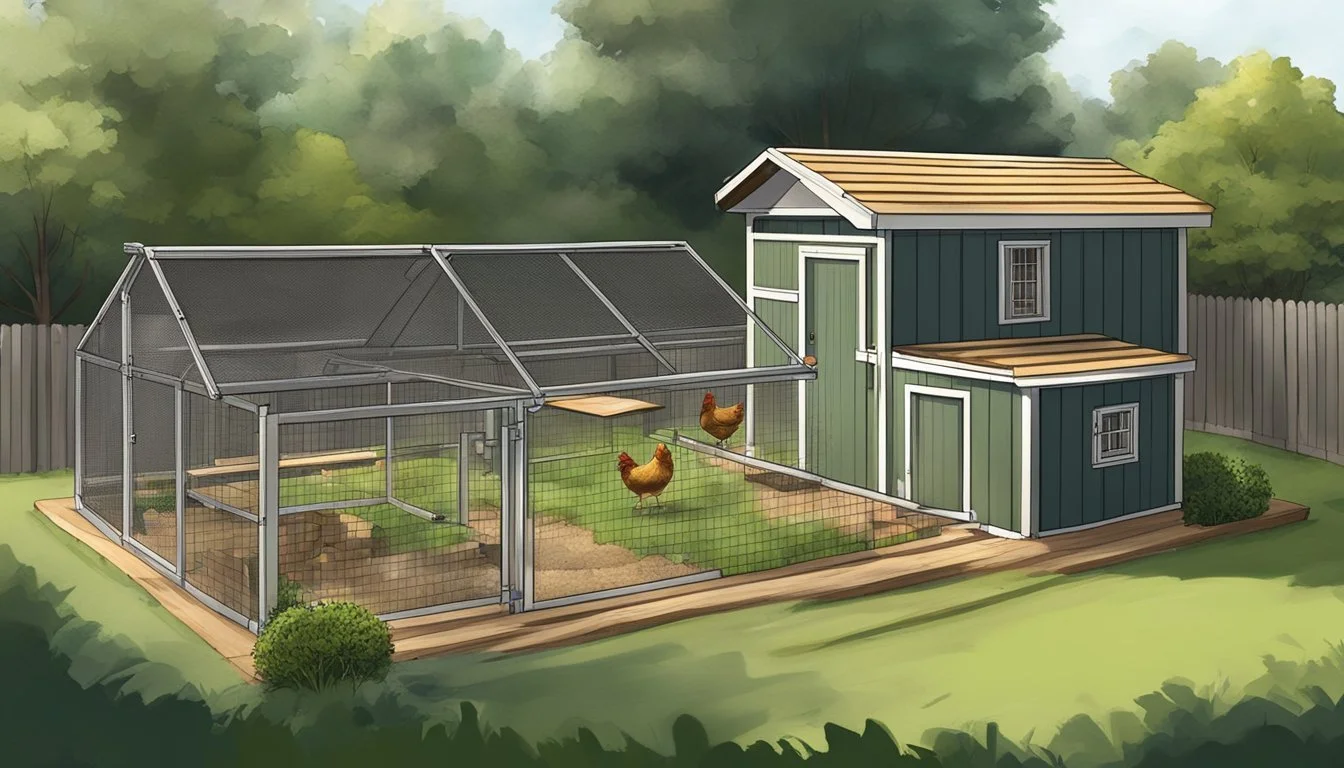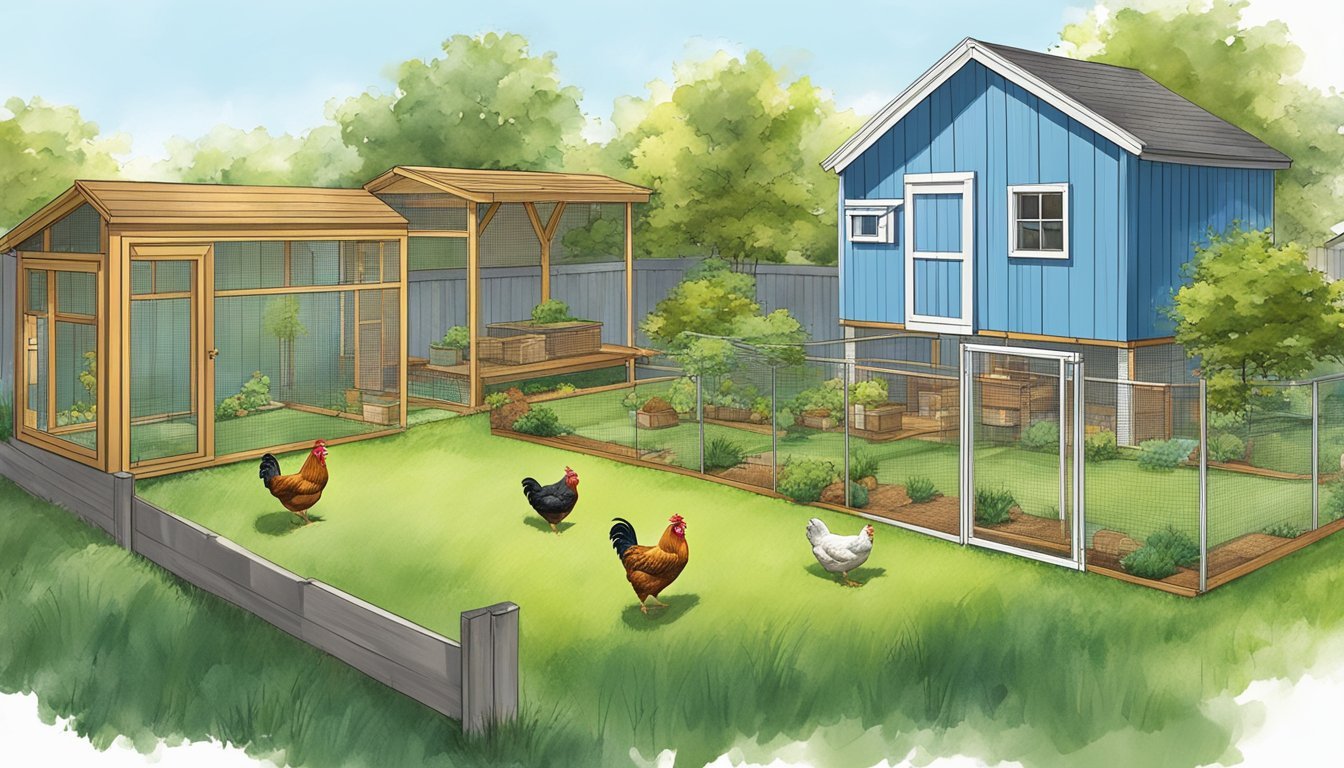Raising Backyard Chickens in Shawnee, KS
Essential Tips for Beginners
Raising backyard chickens has become an increasingly popular endeavor for residents of Shawnee, Kansas, offering a rewarding experience of self-sufficiency and closer engagement with one's food sources. Shawnee allows the practice within city limits, reflecting a broader movement across many communities in Kansas, accommodating those interested in local, sustainable living. Homeowners take the opportunity to produce fresh eggs, educate family members about the origins of food, and delight in the unique pleasure of keeping chickens.
To ensure harmony within the community and to uphold the standards of public health and safety, the City of Shawnee has established clear guidelines for maintaining backyard flocks. Residents can keep up to 10 chickens on their property, a regulation that aligns with the city's commitment to both urban agriculture and neighborhood tranquility. It is important to note that while hens are welcomed, roosters are not permitted, mitigating potential noise issues.
The city supports potential and current chicken owners through resources and informative sessions, aiming to make the process as seamless as possible. Regulations require owners to acquire a Special Animal Permit, emphasizing the responsibility that comes with raising chickens. By emphasizing proper education and adherence to guidelines, Shawnee fosters a responsible and well-informed chicken-raising community.
Understanding Backyard Chickens
Raising backyard chickens in Shawnee, Kansas, offers an engaging way to connect with agriculture and provides fresh eggs for many households. Residents considering this practice should focus on several key components to ensure the welfare of their chickens and compliance with local regulations.
Housing: A secure and well-constructed coop is imperative. It provides shelter from weather and predators. Chickens require a clean, dry, and well-ventilated environment. The coop should include nesting boxes for egg-laying, typically one box per every three to four hens.
Chickens vs. Roosters: Shawnee city ordinances permit up to 10 backyard chickens, but roosters are prohibited to minimize noise disturbances. Chickens are social creatures and thrive in groups, so raising several together is recommended.
Raising Chickens: Individuals raising chickens should provide a balanced diet, fresh water, and regular veterinary care. Chickens need space to roam and exhibit natural behaviors. Predator-proofing the yard is also crucial to protect the flock.
Local Restrictions: Before starting, residents must be aware of and adhere to the local laws, including obtaining any necessary permits and paying associated fees to the City Clerk's office.
By understanding the essentials of raising backyard chickens and following local laws, Shawnee residents can enjoy the benefits of fresh eggs and the pleasure of connecting with a simpler way of life.
Key Aspect Consideration Coop and Housing Must be secure, clean, dry, and well-ventilated Nesting Boxes One box for every 3-4 hens Chickens Allowed Up to 10 per property Roosters Not allowed to keep within city limits Space and Care Adequate space, predator-proof area, vet care Local Regulations Check for permits, fees, and specific limitations
Getting Started in Shawnee
Starting a backyard chicken coop in Shawnee, Kansas requires a thoughtful approach, from adhering to municipal regulations to ensuring proper housing and care for the chickens. Residents should consider legal requirements, suitable locations, coop design, choice of chickens, neighborhood dynamics, and financial implications before embarking on this venture.
Legal Considerations
In Shawnee, individuals are permitted to keep up to 10 backyard chickens, while roosters are prohibited to avoid noise complaints. Regulations are outlined in Chapter 6.10 of the Shawnee Municipal Code, and residents must submit a Special Animal Permit Application along with the fee to the City Clerk's office.
Choosing the Right Location
Selecting an appropriate location for a chicken coop in Shawnee involves ensuring sufficient space that is at least 100 feet from the nearest neighbor's dwelling and complies with local zoning laws. The location should offer protection from predators and extreme weather.
Chicken Coop Essentials
A sturdy chicken coop needs to provide shelter, space, and safety for the chickens. Essentials include:
Nesting Boxes: One box per 3-4 hens
Roosting Bars: Ample space for each chicken to perch
Ventilation: Proper airflow without causing drafts
Protection: Secure latches, fencing, and coverage against predators
Selecting Your Chickens
When selecting chickens, it's important to choose breeds that are well-suited to the Kansas climate. Opt for birds that are known for being hardy, and if egg production is a goal, select breeds with a high laying capacity.
Community Engagement
Engaging with the community helps in easing any concerns and promotes good neighborly relations. Consider sharing plans with neighbors and addressing any possible reservations they might have regarding your backyard chicken endeavor.
Cost Analysis and Budgeting
Prospective chicken owners should conduct a thorough cost analysis, considering expenses such as:
Coop construction or purchase
Feed and water supplies
Veterinary care and vaccinations
Ongoing maintenance costs
Budgeting these expenses upfront will help ensure that the backyard chicken experience is both rewarding and manageable.
Daily Care and Management
Raising chickens in Shawnee, KS, requires adherence to a daily routine that promises health and productivity. The citizens are allowed to keep a flock, and doing so involves consistent feeding, monitoring of health, regular cleaning, careful egg collection, and an understanding of seasonal needs.
Feeding Your Chickens
One should provide a balanced diet to chickens, ensuring they have access to fresh food and clean water. The ideal menu for chickens typically includes commercially prepared feed that meets all their nutritional requirements, augmented with food scraps and occasional treats. It's essential to use feeders that minimize waste and clean water systems that prevent any contamination.
Health and Wellness Checks
Daily inspections for signs of illness or distress are crucial. Chickens should be observed for changes in behavior, appetite, and egg production. Any abnormalities should be addressed promptly to maintain their well-being and the health of the entire flock.
Cleaning and Maintenance
Maintaining clean living conditions is mandatory. Remove droppings from the coop daily and change bedding in nesting boxes as needed. A thorough cleaning of the entire coop should be conducted monthly to keep the environment sanitary and disease-free.
Egg Collection and Storage
Eggs should be collected at least once a day to ensure freshness and to discourage egg-eating behavior among chickens. After collection, eggs need to be stored properly, either at room temperature for short periods or refrigerated to last longer.
Seasonal Considerations
The needs of chickens change with the seasons. In Shawnee, warmer months may require extra measures for cooling and hydration, while colder months demand proper insulation and heating to keep chickens comfortable and healthy. Understanding these seasonal nuances is vital for successful backyard chicken management.
Dealing with Predators and Pests
When raising backyard chickens in Shawnee, KS, one must be vigilant against various predators and pests. The city has set regulations in place, which can be consulted in Chapter 6.10 of the Shawnee Municipal Code, to ensure that poultry is well-protected.
Common Predators:
Raccoons: Identified by puncture marks near the chicken's head, raccoons often attack at night.
Stray Dogs: Both neighborhood and stray dogs can quickly decimate a flock, particularly those free-ranging.
Preventative Measures:
Secure Housing: Ensure coops are fortified with sturdy wire mesh, solid latches, and are free from gaps.
Fencing: A tall fence that extends underground can deter digging animals.
Regular Inspections: Check for signs of attempted entry or damage to enclosures.
Pests, like mites, are another concern for chicken keepers. Mites can cause discomfort and health issues for chickens, spreading quickly through a flock.
Pest Management:
Maintain Cleanliness: Regularly clean the coop and replace bedding to minimize mite infestations.
Quarantine: Isolate new birds before introducing them to an existing flock to prevent the spread of mites.
Both predators and pests pose significant challenges for the backyard chicken enthusiast. It's imperative to establish robust defense strategies to protect poultry investments and ensure the well-being of the flock.
Breeding and Growing Your Flock
When raising backyard chickens in Shawnee, KS, one must consider the specifics of breeding and rearing to successfully grow a flock. Proper understanding of breeding patterns and chick incubation can lead to a thriving group of poultry.
Understanding Breeding Patterns
Breeding chickens requires an organized approach to ensure a healthy and productive flock. The optimal ratio for a breeding group is typically one rooster to every ten to twelve hens. This ensures that the eggs are fertilized without over-stressing the hens. It's crucial to select healthy, purebred chickens for breeding to pass on desirable traits, such as egg production or meat quality. Identification methods like colored leg bands can help keep track of breeding groups.
Incubation and Rearing Chicks
Incubation is a delicate process where eggs are kept under controlled conditions to hatch into chicks. For those in Shawnee, KS, considering the local climate is essential to maintain the correct temperature and humidity levels.
Temperature: 99.5°F (37.5°C)
Humidity: 50-65% first 18 days, 70-75% last three days
Once hatched, chick
s require a warm brooder area and proper care to ensure their survival and growth. Monitoring for adequate food, water, and temperature control is critical in the early stages of development. The chicks will thrive on high-quality starter feed and clean water, setting the foundation for a robust backyard flock.
Local Resources and Supplies
When raising backyard chickens in Shawnee, KS, residents have convenient access to specific local resources for feed, equipment, veterinary services, and supportive community groups. The right supplies and informed advice can ensure a successful backyard poultry experience.
Feed and Equipment Stores
Shawnee offers a variety of stores where one can find high-quality feed and essential chicken-raising equipment. They cater to the specific nutritional needs of poultry at different stages of their lives and also provide necessary hardware for coop construction and maintenance.
Shawnee Feed & Supplies Center
Location: 11121 Johnson Drive, Shawnee, KS
Products: Nutrient-rich feed, feeders, waterers, bedding
Kansas Farm & Home Store
Location: 7379 Quivira Road, Shawnee, KS
Products: Brooders, heat lamps, coops, and fencing
Veterinary Services
Access to veterinary care is critical for maintaining the health of backyard chickens. Shawnee provides such services specializing in poultry, offering regular health check-ups, vaccinations, and treatments for common ailments.
Shawnee Animal Clinic
Location: 4645 Woodland Drive, Shawnee, KS
Services: Poultry health check-ups, vaccinations, disease management
Kansas Poultry Veterinary Services
Location: 8899 Lackman Road, Shawnee, KS
Services: Emergency care, diagnostic services, nutrition advice
Support Groups and Forums
The community in Shawnee can take advantage of several support groups and online forums that share insights on best practices for raising backyard chickens. These platforms provide an opportunity for poultry enthusiasts to exchange tips, ask for advice, and connect with fellow chicken owners.
Shawnee Poultry Farmers Group
Focus: Monthly meetings, coop tours, sharing resources
Kansas Chickens Online Forum
Focus: Online discussions, chicken care tips, local regulations updates
Frequently Asked Questions
When raising backyard chickens in Shawnee, KS, residents often have queries regarding troubleshooting, expanding coops, selling products, and debunking common misconceptions.
Basic Troubleshooting
In raising backyard chickens, one may encounter challenges such as pest infestations or health issues. It's crucial to ensure that the chicken coop is kept clean and secure from predators. Regular inspections for mites, lice, and signs of illness can prevent many problems. A well-ventilated, dry, and clean coop promotes the health of the chickens.
Expanding Your Coop
Those looking to increase their chicken flock must first consider Shawnee's regulations which permit up to 10 backyard chickens. When expanding a coop, proper spacing—typically 2-3 square feet per chicken inside the coop and 8-10 square feet per chicken in the run—is essential for chickens' well-being. Expansion should be planned to maintain a comfortable environment for the birds.
Selling Eggs and Chicken
Residents of Shawnee interested in selling eggs or chickens must adhere to local municipal codes. For instance, if eggs are to be sold, producers must ensure they are clean, properly labeled, and stored at appropriate temperatures. It is advisable to consult local guidelines to confirm any additional requirements or restrictions.
Common Myths Debunked
Myth 1: Chickens are noisy. In reality, hens make relatively little noise. Shawnee prohibits roosters due to their crowing, which addresses noise concerns.
Myth 2: Chickens attract pests. Chickens will actually reduce pests in your yard by eating insects. Keeping their feed in secure containers and maintaining a clean coop will discourage unwanted pests.
Conclusion
Raising backyard chickens has become an embraced practice in Shawnee, Kansas, reflecting a broader trend toward sustainable living and local food sources. Residents who undertake this endeavor must abide by the city's guidelines, which facilitate a harmonious balance between this activity and community living.
Key Regulations:
Permits: Residents are required to obtain a Special Animal Permit.
Fees: The fee for a new permit is $90; renewals are $45.
Hen Limit: Up to 10 hens are permissible per property.
Roosters: Roosters are prohibited to prevent noise disturbances.
Residents should invest in proper equipment and quality feed to ensure the health and productivity of their chickens. Additionally, constructing a suitable coop, considering size and security, plays a vital role in the successful raising of backyard chickens.
The community of Shawnee offers resources and information, such as detailed brochures, to assist potential and current chicken owners. Engaging in this activity is not only about yielding fresh eggs but also about adopting a lifestyle that values self-sufficiency and community engagement.
Individuals must be mindful of neighbors and apply best practices for coop cleanliness and waste management. By adhering to these standards, Shawnee's citizens can enjoy the rewards of raising backyard chickens while maintaining good community relations.







